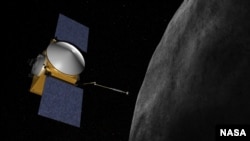NASA’s first mission to rendezvous with an asteroid and return a sample to Earth was given the green light to proceed into the development stage May 15 with the goal of a launch in 2016.
The Origins-Spectral Interpretation Resource Identification Security Regolith Explorer (OSIRIS-REx) will rendezvous with the asteroid Bennu in 2018 and return a sample of it to Earth in 2023.
"This means NASA believes we have an executable plan to return a sample from Bennu. It now falls on the project and its development team members to execute that plan," said Mike Donnelly, OSIRIS-REx project manager at NASA's Goddard Space Flight Center in Greenbelt, Md.
NASA says Bennu could hold clues about the origin of the solar system. It is expected to bring back a minimum of 60 grams of surface material from Bennu and also mapping the asteroid’s global properties and measuring non-gravitational forces.
Bennu was discovered on September 11, 1999 and has a mean diameter of about 493 meters.
The name Bennu, a heron-like Egyptian god similar to a phoenix, was selected earlier this month after NASA held naming contest. A third grader from North Carolina came up with the winning name.
In the future, NASA plans to land humans on asteroids.
Here's more on the mission:
The Origins-Spectral Interpretation Resource Identification Security Regolith Explorer (OSIRIS-REx) will rendezvous with the asteroid Bennu in 2018 and return a sample of it to Earth in 2023.
"This means NASA believes we have an executable plan to return a sample from Bennu. It now falls on the project and its development team members to execute that plan," said Mike Donnelly, OSIRIS-REx project manager at NASA's Goddard Space Flight Center in Greenbelt, Md.
NASA says Bennu could hold clues about the origin of the solar system. It is expected to bring back a minimum of 60 grams of surface material from Bennu and also mapping the asteroid’s global properties and measuring non-gravitational forces.
Bennu was discovered on September 11, 1999 and has a mean diameter of about 493 meters.
The name Bennu, a heron-like Egyptian god similar to a phoenix, was selected earlier this month after NASA held naming contest. A third grader from North Carolina came up with the winning name.
In the future, NASA plans to land humans on asteroids.
Here's more on the mission:





